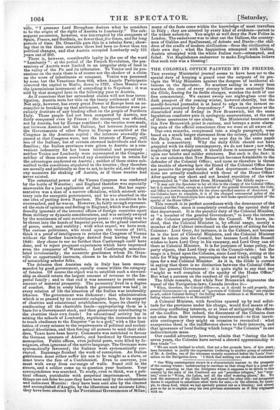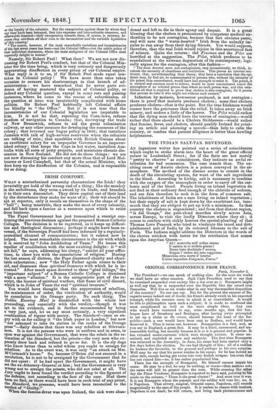THE COLONIAL OFFICE PAINTED BY ITS FRIENDS. THE evening Ministerial
journal seems to have been set to the special duty of keeping a guard over the outposts of its pro- teges the Whis. Ministers against the dangers of incidental al- lusions in the ° Spectator. No mariner sailing in a crazy boat watches the crest of every stormy billow more anxiously than the Globe, fearing for its feeble charges, watches the drift of our free commentary. We cannot sweep our night-glass over the dark prospect of the coming winter, however cheerily, but the moody-hearted journalist is at band to edge in the earnest re- assurances prompted by despondency.* We cannot glance at the dissatisfied state of feeling in New Brunswick, but the same lugubrious comforter puts in apologetic asseverations, at the rate of three assurances to one alarm. The Ministerial treatment of this New Brunswick point is curious' and betrays a more alarm- ing state of the official conscience than we were at all aware of. Our own remarks, compressed into a single paragraph, were based on a much longer statement from the colony, published by the Daily News, and followed up next day in the same paper with a commentary. Why the daily Globe should not have grappled with its daily contemporary, we do not know ; nor why, neglecting that antagonist, it should deem it necessary to fasten upon our briefer and milder strictures. But such is the fact: it is in our columns that New Brunswick becomes formidable to the defender of the Colonial Office; and upon us therefore is thrust the trouble of showing how the friend of the Colonial Office does not perceive the proper duties of that department—whose func- tions are actually confounded with those of the Home Office! After quoting our short and not heated repetition of the view propounded in "the letter from Miramichi," the Globe says— "it may suit the Spectator to lay all this to the charge of the Colonial Office; but it is manifest that, except as a member of the general Government, the Colo- nial Office is nowise responsible for the above. specified sources of discontent If the Colonies have to complain, it is of the changed commercial policy of the country; and the Protectionists here might as well make special complaint of 'the apathy of the Home Office.'" This remark is in perfect accordance with the demeanour of the Colonial Office, since it completely overlooks the special duty of that department. It is the peculiar duty of the Colonial Minister, as "a member of the general Government," to keep the interest of the Colonies perpetually before the Council. We know, in- deed, that the Colonial Minister is, by official usage, merely a member of the Cabinet introduced on the pretext of sitting for the Colonies: Lord Grey, for instance, is in the Cabinet, not because he is the best of Colonial Ministers, and the Colonial Minister must be taken into the Council, but because Lord John Russell wishes to have Lord Grey in his company, and Lord Grey can sit there as Colonial Minister. It is for purposes of home policy, for party objects, that Lord Grey sits at the Council-table : but the usage is a fraud upon the Colonies, since Lord Grey, sitting at the table for Whig purposes, preoccupies the seat which ought to be open for a real Colonial Minister. As it is, the Globe is correct in saying that there is no distinction between the Colonial Office and the general Government : it is quite right to say that one "might as well complain of the apathy of the Home Office." But what a sarcasm on the conduct of its proteges The Globe remarks, that while New Brunswick deprecates the repeal of the Navigation-laws, Canada invokes it— "When, therefore, the Colonial Office—or, as it should be said properly, the general Government—is accused of 'ignorance of Colonial feeling,' one requires to ask, which Colonial feeling? the feeling whose residence is at Montreal, or the feeling whose residence is at Miramichi?"
A Colonial Minister, with faculties spurred up by real solici- tude for the provinces under his charge, would find means of re- conciling conflicting interests, or at least of mitigating the effects of the conflict. But indeed, the discontent of the Colonies does not arise from their interests being contravened—to that inevit- able contingency they might on occasion be reconciled : what exasperates them is the indifference shown to their interests, and that ignorance of local feeling which lumps "the Colonies" in one indiscriminate mass.
Our candid adversary, however, admits that "during the last seven years, the Colonies have served a shrewd apprenticeship to free trade "—
" We are much inclined to admit, that not a few grounds have, of late years, been furnished to justify the expressions (referring to another group of colonies) of Mr. A. Geddes, one of the witnesses recently examined before the Lords' Com- mittee on the Navigation-laws. I think that nothing can shake the attachment
Our Whig contemporary recurs in a characteristic manner to the prospects of the coming winter: endeavouring to convince us that cheap food is a great ad- vantage; assuring us that the foreigners whom it supposes to be driven to this country by the state of the Continent are not "penniless refugees," but "tour- ists," come to "Wales, the Lakes, and all the chief watering-places," &c. We took tbe statement of the Globe itself, and showed the other side: our antagonist deems it expedient to substitute other views for ours,—in the allusion, for exam- ple, to cheap food, which we had specially pointed out as a blessing; and almost goes so far as to explain away his own previous statements as if they originated with us.
or the loyalty of the colonists. But the exasperation against those by whom they say they have been betrayed, first into expenses and impracticable measures, and afterwards deserted—their exasperation towards them, of course, is extreme, be- cause they attribute all their ruin to the inconsistent and the variable legislation of this country.'
"The source, however, of the most remarkable variations and inconsistencies of the last seven years has been—not the Colonial Office—but the subtle policy of that individual statesman, whom the main maligners of the Colonial Office most especially delight to honour."
Namely, Sir Robert Peel! What then? We are not now dis- cussing Sir Robert Peel's conduct, but that of the Colonial Min- ister for the time being, which is very seriously and dangerously aggravating disaffection in every group of our Colonial empire. What reply is it to us, if Sir Robert Peel made equal mis- takes in Colonial policy ? We have more than once taken occasion to censure his shortcomings in that branch of ad- ministration : we have remarked that he never gave evi- dence of having mastered the subject of Colonial polity, or indeed any Colonial question, except in some rare and passing instances, where he came to the rescue of subordinates, or the question at issue was inextricably complicated with home politics. Sir Robert Peel habitually left Colonial affairs too blindly to " the Office." But it is not true that the inconsistencies of our Colonial legislation are imputable to him. It is not he that, repealing the Corn-laws, refuses freedom of navigation to Canada ; that, destroying the trade of New Brunswick, refuses to aid the great colonization railway, or any other measure for developing the resources of the colony; that reversed our Sugar policy in 1846; that tantalizes Jamaica with talk of high-service reservoirs when the colonists are talking of ruin ; that squabbles with British Guiana about an exorbitant salary for an unpopular Governor in an impover- ished colony ; that keeps the Cape in hot water, tantalizes Aus- tralia with all sorts of petty projects, and maintains chronic dis- sension in New Zealand. He did not do these things : we are not now discussing his conduct any more than that of Lord Mel- bourne or Lord Campbell, but that of the actual Minister, who does keep up the disaffection of the Colonies, and is responsible for so doing.

























 Previous page
Previous page